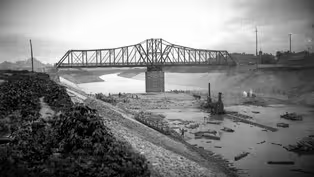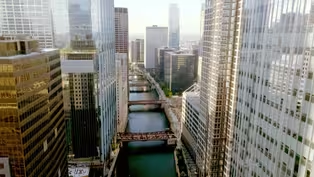Chicago Stories
The River Today
Clip: 9/29/2023 | 3m 42sVideo has Closed Captions
Environmental groups discuss the health of the Chicago River today.
Environmental groups discuss the health of the Chicago River today.
Problems playing video? | Closed Captioning Feedback
Problems playing video? | Closed Captioning Feedback
Chicago Stories is a local public television program presented by WTTW
Lead support for CHICAGO STORIES is provided by The Negaunee Foundation. Major support is provided by the Abra Prentice Foundation, Inc. and the TAWANI Foundation.
Chicago Stories
The River Today
Clip: 9/29/2023 | 3m 42sVideo has Closed Captions
Environmental groups discuss the health of the Chicago River today.
Problems playing video? | Closed Captioning Feedback
How to Watch Chicago Stories
Chicago Stories is available to stream on pbs.org and the free PBS App, available on iPhone, Apple TV, Android TV, Android smartphones, Amazon Fire TV, Amazon Fire Tablet, Roku, Samsung Smart TV, and Vizio.

Chicago Stories - New Season!
Blizzards that brought Chicago to a standstill. A shocking unsolved murder case. A governor's fall from power. Iconic local foods. And the magic of Marshall Field's legendary holiday windows.Providing Support for PBS.org
Learn Moreabout PBS online sponsorship- [Narrator] And environmental groups, like the Friends of the Chicago River, have played a key role in cleaning up the waterways.
- What Friends has been doing is to work to improve and protect the river for people, for plants, and for wildlife.
The big goal is to actually rid the river of trash completely.
So that's through policy, that's through on the ground projects and litter free removal days like today that we were out on the river collecting trash.
- [Volunteer] Yay.
- [Narrator] As the health of the water improved, so too did life in the river.
More fish began to appear.
- We've seen a huge increase in the number of species.
- [Fisherman] Aha, fish up.
- [Austin] Back in the '70s, they maybe found less than five species at any given location.
Across the whole system, somewhere around 60 to 70 species can be found.
You can catch bass, you can catch catfish that are all pretty large here.
- [Narrator] But more fish isn't always a good thing.
When the Chicago River was connected with the Mississippi River watershed, that opened a door for invasive species.
(fish splashing) Like the Asian carp.
- We have created sort of a highway for invasive species that are making their way to Lake Michigan and threatening our fish population.
- [Narrator] Experts fear what might happen if Asian carp reach Lake Michigan.
- Generally, the consensus is that it won't be great because the Great Lakes are a 7 to $8 billion fishery.
And so we don't want something to go in there, and disrupt it, and something that we can't manage.
- [Narrator] Thanks to an electrical barrier in the Sanitary and Ship Canal, Asian carp are in for a shock if they try swimming to Chicago.
- [Austin] You can actually go down there and see fish swim up and then say, "Nope," and turn back around.
- I can't believe that electric fences are going to keep them out forever.
And once they get up into the Chicago River, they'll get into the Great Lakes.
I guess our children will be eating Asian carp at dinner.
Hopefully, they're tasty.
- [Narrator] Some environmentalists say the real solution is to separate the Mississippi River Basin from the Great Lakes.
In other words, re-reverse the Chicago River.
- There's a reason why the Creator created the world as it is.
That's what we believe.
If the Creator created the Chicago River to flow into Lake Michigan, then it's meant to flow into Lake Michigan.
- We cannot think of water as waste.
We must think of it in other ways.
So if we're not centering public interest when we're asking, "Should we reverse the river," then we're gonna find ourselves with the same amount of problems just at a different scale.
- [Narrator] Re-reversing the river would be a massive project.
The Army Corps of Engineers says it could take 25 years and cost more than $18 billion to separate the watersheds.
- You can't undo the reversal, you cannot.
We're still looking at a water system that for over 100 years had raw sewage, and the stockyard blood, industrial chemicals, phosphorus, soap, glue makers, all of this as part of that muck at the bottom of the river.
The idea of allowing any of that to flow into the lake, I think would be a really great threat.
Video has Closed Captions
Clip: 9/29/2023 | 3m 41s | On January 2, 1900, Chicago reversed its river. (3m 41s)
Clip: 9/29/2023 | 2m 1s | Fly above the Chicago River via drone for two minutes of tranquility. (2m 1s)
When Chicago’s Waterways Were Polluted
Video has Closed Captions
Clip: 9/29/2023 | 4m 21s | In the 19th century, Chicago’s waterways were teeming with disease. (4m 21s)
Providing Support for PBS.org
Learn Moreabout PBS online sponsorshipSupport for PBS provided by:
Chicago Stories is a local public television program presented by WTTW
Lead support for CHICAGO STORIES is provided by The Negaunee Foundation. Major support is provided by the Abra Prentice Foundation, Inc. and the TAWANI Foundation.


















